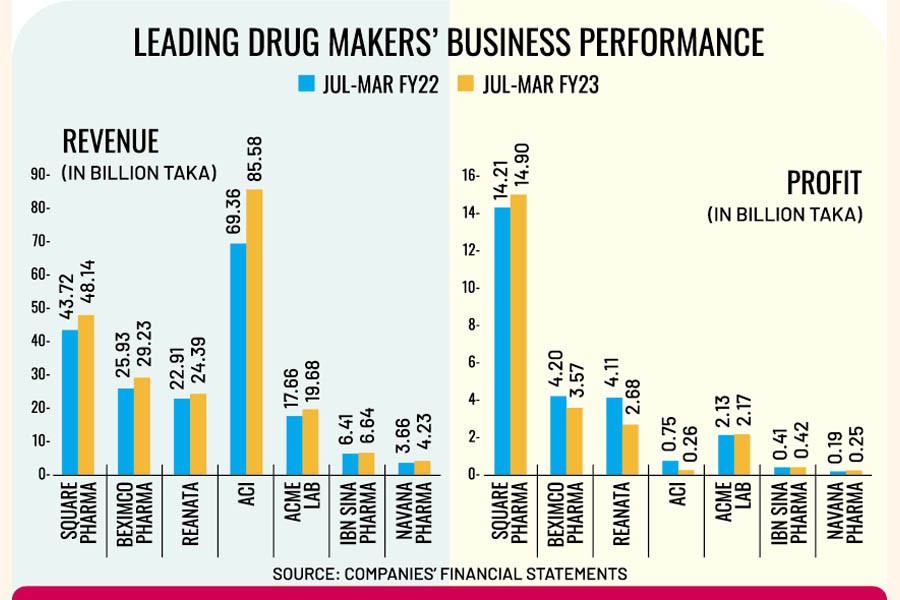Leading drug makers' profits down in Q3 for high production costs

MOHAMMAD MUFAZZAL AND BABUL BARMAN
Published :
Updated :

Leading drug makers endured a year-on-year decline in profit in the latest quarter through March of FY23 owing to higher production costs.
Square Pharmaceuticals, Beximco Pharmaceuticals, Renata and ACI saw their profits drop up to 57 per cent year-on-year in the three months through March on the back of increased costs.
The sales revenue grew higher in the quarter, compared to the same period a year ago, but high cost of goods sold pushed up production costs, market operators said.
Production costs of pharmaceutical companies have gone up significantly due to a rise in import costs, said Chairman of EDGE Asset Management ASif Khan.
"But the companies could not increase product prices in keeping up with the rising costs of production," he said.
The impact of the local currency depreciation observed in the previous quarters was reflected in the balance sheets of the latest quarter.
The sudden hike in the sales of medicines, which was seen at the outbreak of the pandemic, has gradually come down.
Beximco Pharmaceuticals has a foreign currency loan, which drove its profit down, Mr Khan said.
Square Pharma, the flagship company of Square Group, saw a 6.23 per cent year-on-year drop in profit to Tk 4.28 billion in January-March despite an increase in the sales revenue.
The leading drug maker's gross sales revenue increased 11 per cent to Tk 18.72 billion in the period.
Its Chief Financial Officer (CFO) Md Zahangir Alam said the taka losing value against the dollar played a major role in the erosion of the company's net profit.
Price adjustment was not possible, he added.
Square Pharma's cost of goods sold increased more than 14 per cent to Tk 8.21 billion in the three months through March.
Its annual profit surged 14 per cent to Tk 18.18 billion in FY22, thanks to the launching of new drugs as well as strong marketing strategy.
Beximco Pharmaceuticals saw a 15 per cent year-on-year dip in profit to Tk 908 million in January-March, despite a 6.58 per cent growth in revenue to Tk 9.55 billion.
An official of Beximco Group, on condition of anonymity, said the devaluation of the local currency and global and local economic concerns ate up the company's profit.
"Import and export costs increased significantly because of freight charges. The surge in energy prices too has eroded the companies' profit," he said.
As the dollar became costlier, payment for freight charges went up.
As a result, Beximco Pharma's cost of goods sold was up 9 per cent to Tk 5.34 billion in January-March, compared to the same period a year ago.
Renata's profit tumbled 57 per cent in the third quarter; its 11 percent revenue growth could not offset costs.
Its consolidated revenue increased to Tk 8.45 billion while profit dropped to Tk 580 million in the three months.
Company secretary Jubayer Alam said that profit had shrunk due to the increased cost of goods sold.
The cost surged by 17 per cent to Tk 4.54 billion in the quarter mainly due to an increase in raw material prices caused by global inflation.
ACI, one of the country's leading business conglomerates, saw 42 per cent lower profit year-on-year in January-March though it could secure a growth in sales.
Its consolidated profit stood at Tk 80 million in the quarter against Tk 138 million the year before. However, its sales revenue jumped 21 per cent to Tk 28.51 billion in the same timeframe.
Though the ACI's profit remained positive, its consolidated earnings per share (EPS) had gone negative at Tk 1.45 in the nine months through March.
The company incurred a loss of Tk 3.94 per share in July-September of FY23, which could not be offset by profits in the next two quarters.
The newly-listed Navana Pharma posted 54 per cent year-on-year profit growth to Tk 105 million in January-March, riding on higher sales revenue.
The drug maker's sales revenue increased 23 per cent to Tk 1.50 billion in the quarter.
Company secretary Jounul Abedin said profit had jumped as the sales of branded products increased.
The company emphasized on increasing the production of high-end drugs, which boosted sales in the human health division by 60 per cent in the nine months through March.
Because of its stock market listing, the company also enjoyed tax benefit that helped it to post higher profits, Mr Abedin added.


 For all latest news, follow The Financial Express Google News channel.
For all latest news, follow The Financial Express Google News channel.